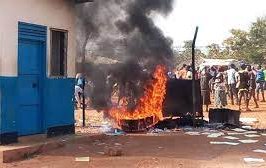Kampala, Uganda | A recent uprising in Yumbe District, triggered by Muslim youth attacking businesses accused of selling pork in a predominantly Muslim area, has highlighted deeper social and structural divisions in northern Uganda. What began as a dispute over “forbidden meat” reflects historic religious marginalisation, cross‑border pressures, and fragile regional unity.
The unrest erupted when police attempted to arrest Kasim Abdallah, an imam who posted a video urging the local Muslim community to reject pork sales. His call sparked protests that led to dozens being injured, numerous arrests, and at least one government vehicle set ablaze.
For many in Yumbe, the pork issue tapped into long‑standing grievances. Muslims in northwestern Uganda, though a majority in the region, feel sidelined in politics, education, and economic opportunities, while the area itself has remained under‑developed and vulnerable to border‑zone tensions. This event underscores a community that feels both religiously and regionally marginalised.
The region’s porous border with South Sudan and the presence of the large Bidibidi Refugee Settlement have transformed Yumbe into a complex mix of host communities, refugees, and informal economies. These converging pressures identity, trade, and displacement are magnified when symbolic triggers like pork ignite local tensions.
Analysts caution against simplifying the incident as mere religious extremism. It is better understood as a visible symptom of deeper structural vulnerabilities in the region: youth unemployment, neglected infrastructure, weak governance, and a pervasive sense of exclusion. One local elder described it as a collision of faith, identity, and perceived lack of state presence.
Security measures have so far focused on containment, but longer‑term solutions will require investment in youth development, education, cross‑community dialogue, and local economic growth. Sustainable peace depends not just on policing but on transforming the social and economic fabric of frontier districts like Yumbe.
The pork incident serves as both a warning and an opportunity. If addressed holistically, it could prompt Uganda to invest more in its frontier regions and promote inclusive development; if ignored, it risks deepening the fault lines now visibly exposed.
